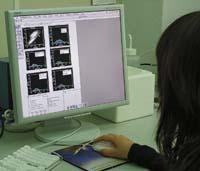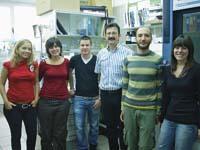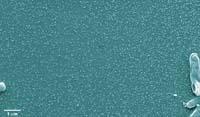Search for specific drugs for inflammation
2008/11/01 Álvarez Busca, Lucía - Elhuyar Zientziaren Komunikazioa Iturria: Elhuyar aldizkaria

Under the direction of Antonio Gómez-Muñoz, the team works on the research of alternatives to these drugs creating analogs of the phosphate molecule C1P --cerida 1 phosphate. This molecule was first discovered in 1990 in a case of human leukemia. After his synthesis in the laboratory, they saw that he is an important mitogenic agent, which causes cell growth and blocks his natural death. After the study of the molecule, it has been observed that the inflammatory process tends to be affected, that is, when the cells detect this molecule release the molecules that produce inflammation, such as prostaglandins and cytokines.
But this does not happen with all kinds of cells. Although it seems contradictory, the same molecule produces an anti-inflammatory effect in several cell types. Hence this research group has departed: The elimination of the ability to cause inflammatory processes in the C1P molecule would allow its use as anti-inflammatory in certain types of cells without affecting the rest of the cells.
Remove one of the capacities
To do this, they have created synthetic molecules with a structure very similar to that of the C1P molecule, in collaboration with another research group in Barcelona. This group, led by doctors Josefina Casas of the IBMB-CSIC of Barcelona and Gemma Fabriás of the IIQAB-CSIC, is formed by Dr. Antonio Delgado of the University of Barcelona. They are pharmaceutical and organic chemicals that get the UPV team customized molecules.
So far they have tested 50 C1P analogues to measure. Three of them have achieved the result provided by the group, that is, they function as anti-inflammatory without causing inflammatory processes in other cells. These analogues do not generate prostaglandins, as does the C1P molecule, so there is no inflammatory process.

Inflammation and cancer
Inflammatory processes can have different origins, such as an infection. There are chronic inflammatory diseases that, due to their cellular instability, provoke in many cases processes of neoplasia - that is, the formation of new tissues of tumoral character -. This type of disease is ulcerative colitis and multiple sclerosis. This is because the state of continuous inflammation has a significant influence on cells. This can destabilize cells and cause uncontrolled growth of cells, as well as block the programming of cells to kill them by themselves.
At present there are very few groups that study the anti-inflammatory capacities of the molecule of C1P --in Virginia (USA), in the pharmaceutical company Novartis (Austria) and in certain research groups-, being the group of Antonio Gómez-Muñoz the first to study it in 1995. At the moment, the research has been tested at the cellular level, that is, it is in the first phase of the investigation. From now on they will have to test it in tissues and organs.


Gai honi buruzko eduki gehiago
Elhuyarrek garatutako teknologia






